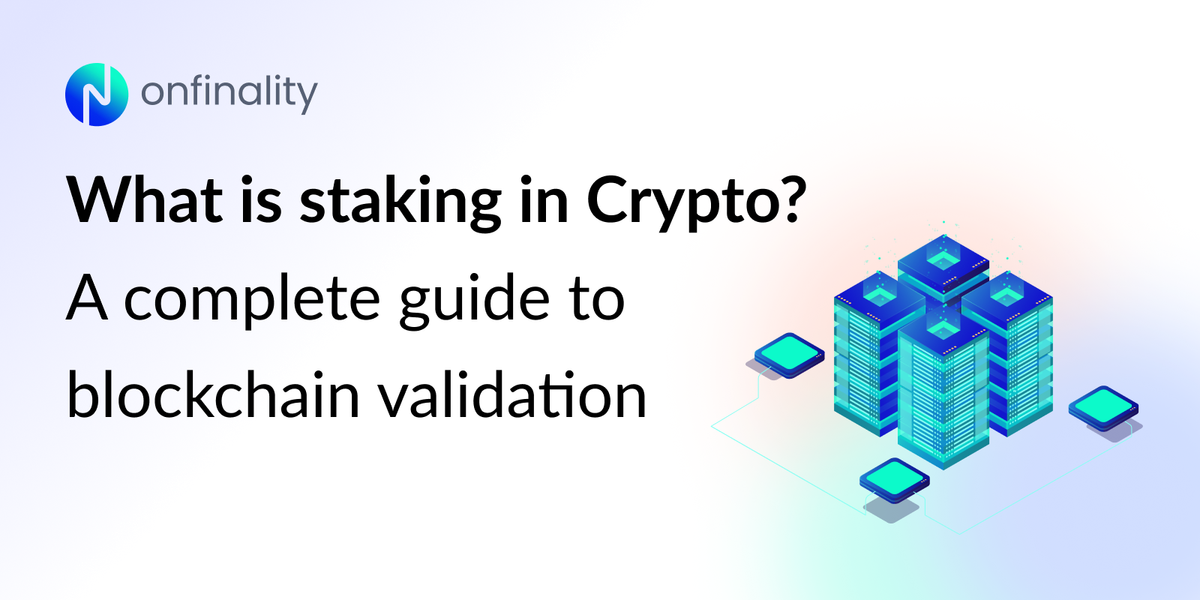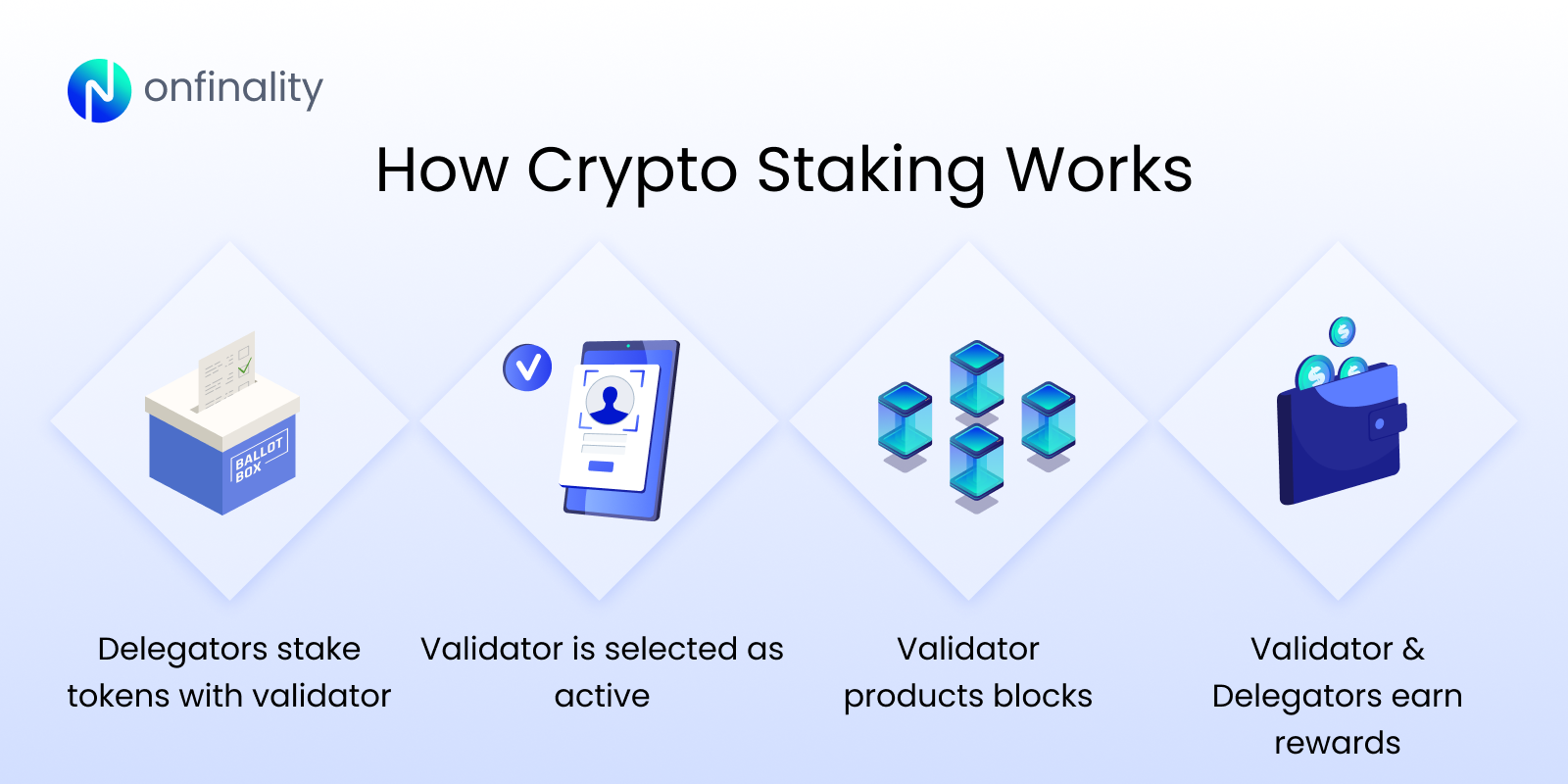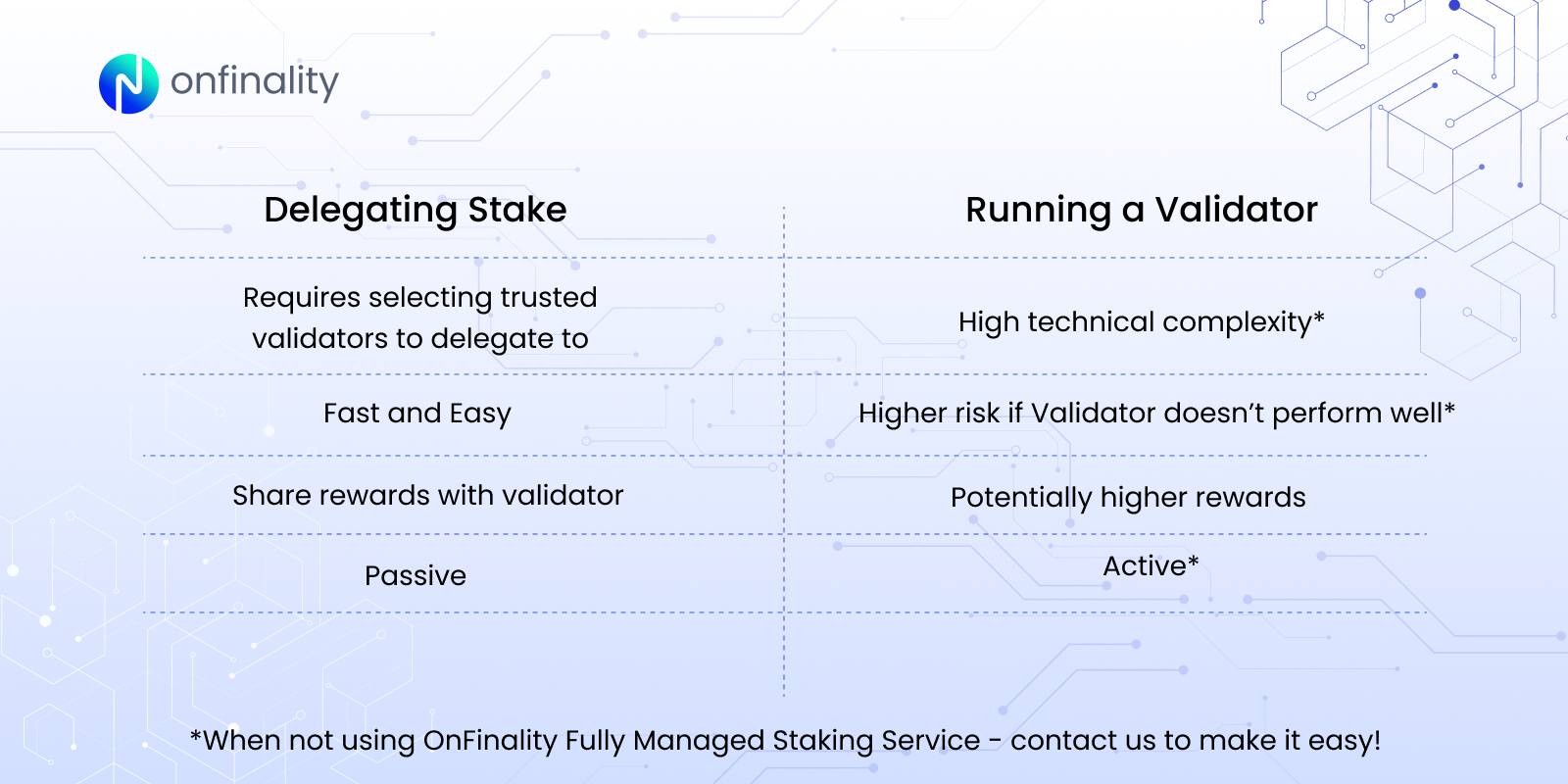What is staking in crypto? A complete guide to blockchain validators
We explain what staking is, how it works, the benefits, the difference between running your own validator and nominating, and why OnFinality makes running a validator easier than ever.

Staking has become one of the most popular ways to earn passive income in the world of crypto. By locking up your tokens to support a blockchain network, you can earn rewards while helping to secure the system.
In this guide, we’ll explain what staking is, how it works, the benefits, the difference between running your own validator and nominating, and why OnFinality makes running a validator easier than ever.
What is Staking?
Staking is the process of committing your cryptocurrency to support a blockchain network that uses a Proof of Stake (PoS) or similar consensus mechanism. In return, participants earn staking rewards. Unlike mining, which relies on energy-intensive computation, staking is eco-friendly and designed for scalability.
When you stake your tokens, you’re essentially helping validate transactions and secure the blockchain.
How Does Staking Crypto Work?

When you stake crypto, your tokens are delegated or locked in a wallet to a validator node. Validators are chosen to propose and verify new blocks on the blockchain. The more tokens staked, the higher the chance of being selected, and the greater the potential rewards.
For example:
- Staking Ethereum (ETH): With Ethereum’s transition to Proof of Stake, ETH holders can stake 32 ETH to become validators or delegate to a staking pool.
- BNB Staking: Binance Smart Chain allows users to stake BNB and participate in governance while earning competitive returns.
Benefits of Staking
- Earn Rewards – Receive staking rewards in the form of more tokens.
- Support the Network – Contribute to blockchain security and decentralization.
- Lower Energy Costs – Compared to Proof of Work mining, staking is much more energy efficient.
What is a Blockchain Validator?
A validator is a node operator who is responsible for proposing and validating new blocks in a Proof of Stake network. Validators are the backbone of staking, ensuring the blockchain remains secure, decentralized, and trustworthy.
Becoming a validator requires reliable infrastructure. Downtime or poor performance could mean losing out on rewards - or worse, penalties (slashing).
Should I run my own validator or delegate?
When participating in staking, you generally have two options

Running Your Own Validator
Running your own validator means setting up and maintaining a node that directly participates in securing the blockchain.
Other people can then stake their tokens on your node earning yourself a commission from their tokens - a reward potentially higher than what you could earn with only your own stake.
- Pros: Maximum rewards, full control, ability to contribute directly to network security.
- Cons: Requires technical expertise, reliable hardware, and 24/7 uptime. Mistakes (like downtime or misconfiguration) can lead to penalties known as slashing.
Delegating your stake to Other Validators
Instead of running your own node, you can delegate (nominate) your tokens to an existing validator.
- Pros: Much simpler, no infrastructure setup, lower risk of penalties.
- Cons: Your rewards may be lower shared with the validator, you have less control, and must trust the validator’s reliability.
Which should you choose?
- If you’re looking for convenience, delegating is the easiest way to earn rewards.
- If you want to maximize earnings and directly support decentralization, running your own validator is the way to go - especially with reliable infrastructure partners like OnFinality.
Why Run My Validator with OnFinality?
Running your own validator can be challenging without the right tools. OnFinality provides enterprise-grade blockchain infrastructure designed to keep your validator online, secure, and performing at its best.
You have two options:
- Self-Service Validator Hosting: Deploy and manage your own validator with OnFinality’s battle-tested infrastructure. Perfect if you want control and flexibility, but still want the reliability of automated monitoring, scaling, and 99.9% uptime guarantees.
- Fully Managed Validators: Let OnFinality handle everything - from setup to ongoing monitoring and upgrades. Ideal for investors and venture capitalists who want to focus on staking rewards without worrying about server maintenance or technical complexities.
Whether you’re staking Ethereum, Polkadot, or other networks, OnFinality helps ensure your validator operates seamlessly - maximizing your rewards and minimizing risk.
Additional Resources
Technical Guide: Setting up your validator
OnFinality's Staking & Validation Services
Final Thoughts
Staking is more than just a way to earn passive income—it’s about contributing to the future of decentralized networks. Whether you’re staking Ethereum, trying out BNB staking, or exploring other networks, understanding the difference between running your own validator and nominating is key.
If you’re ready to take the next step and run your own validator, OnFinality provides both self-service and fully managed solutions to help you succeed.
About OnFinality
OnFinality is a blockchain infrastructure platform that saves web3 builders time and makes their lives easier. OnFinality delivers scalable API endpoints, nodes, and indexers for the biggest blockchain networks and empowers developers to automatically test, deploy, scale and monitor their own blockchain nodes in minutes.
To date, OnFinality has served hundreds of billions of RPC requests, supports over 125 networks including Avalanche, BNB Chain, Cosmos, Polkadot, Ethereum, and Polygon, and is continuously expanding these mission-critical services so developers can build the decentralised future, faster!
